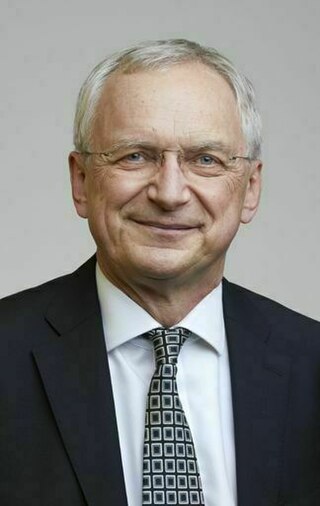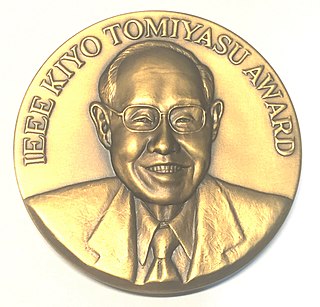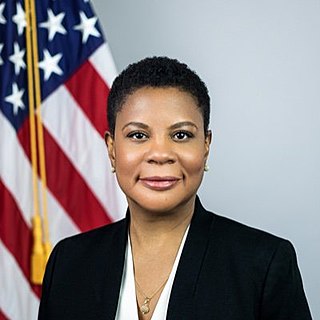
Vint Cerf is an American Internet pioneer and is recognized as one of "the fathers of the Internet", sharing this title with TCP/IP co-developer Bob Kahn.

Gordon Earle Moore was an American businessman, engineer, and the co-founder and emeritus chairman of Intel Corporation. He proposed Moore's law which makes the observation that the number of transistors in an integrated circuit (IC) doubles about every two years.

Robert Charles Wright is an American lawyer, businessman, lobbyist, and author. He is a former NBC executive, having served as president and CEO from 1986 to 2001, and chairman and CEO from 2001 until he retired in 2007. He has been credited with overseeing the broadcast network's expansion into a media conglomerate and leading the company to record earnings in the 1990s. Prior to NBC, he held several posts at General Electric in the 1960s, 70s and 80s. He served as President and CEO of GE Capital, GE Financial Services 1983 to 1986 and served as GE's vice chairman until he retired from that role in 2008.

Charles Stewart Mott was an American industrialist and businessman, philanthropist, a co-owner of General Motors, and the 50th and 55th mayor of Flint, Michigan.

Sir Andrew Hopper is a British-Polish computer technologist and entrepreneur. He is Chairman of lowRISC CIC, a Commissioner of the Royal Commission for the Exhibition of 1851, former Treasurer and Vice-President of the Royal Society, Professor Emeritus of Computer Technology at the University of Cambridge, an Honorary Fellow of Trinity Hall, Cambridge and Corpus Christi College, Cambridge.

John Thomas Chambers is the former executive chairman and CEO of Cisco Systems.
The Aspen Institute is an international nonprofit organization founded in 1949 as the Aspen Institute for Humanistic Studies. The institute is headquartered in Washington, D.C. It also has campuses in Aspen, Colorado, its original home.

Henry Samueli is an American businessman, engineer, and philanthropist.

The Phone Co-op was an independent consumer co-operative in the United Kingdom. It provided landline, mobile telephone and Internet services, including web hosting and broadband. In April 2018, the Phone Co-op board agreed for its operations to be transferred to the Midcounties Co-operative, with the Phone Co-op legal entity ceasing to exist. The brand continued to be operated until 1 June 2018, when it was rebranded to Your Co-op following the completion of the transfer.

The Berkman Klein Center for Internet & Society is a research center at Harvard University that focuses on the study of cyberspace. Founded at Harvard Law School, the center traditionally focused on internet-related legal issues. On May 15, 2008, the center was elevated to an interfaculty initiative of Harvard University as a whole. It is named after the Berkman family. On July 5, 2016, the center added "Klein" to its name following a gift of $15 million from Michael R. Klein.

William Earl Kennard is an American attorney and former government official. Kennard served as chairman of the Federal Communications Commission (FCC) from 1997 to 2001 under President Bill Clinton, and was the first African American to lead the agency. In 2009, Kennard was appointed by President Barack Obama to serve as Ambassador to the European Union, serving until 2013.

CEPT University, formerly the Centre for Environmental Planning and Technology, is an academic institution located near University Area in Ahmedabad, India offering undergraduate, postgraduate and doctoral programmes in areas of natural and developed environment of human society and related disciplines.

Stephen Anthony Benton was the inventor of the rainbow hologram and a pioneer in medical imaging and fine arts holography. Benton held 14 patents in optical physics and photography, and taught media arts and sciences at Massachusetts Institute of Technology (MIT). He was the E. Rudge ('48) and Nancy Allen Professor of Media & Sciences, and the Director for Center for Advanced Visual Studies (CAVS) at MIT.
Jeremy Coller is a British businessman and philanthropist. He is the founder, chief investment officer and chairman of Coller Capital.

Robert Warren Pittman is an American businessman. Pittman was the CEO of MTV Networks and the cofounder and programmer who led the team that created MTV, and is the cofounder of iHeartMedia and Casa Dragones Tequila. Pittman joined iHeartMedia's predecessor company Clear Channel in November 2010 as an investor and the company's Chairman of Media and Entertainment Platforms, was named CEO in 2011 and chairman in 2013. Pittman led Clear Channel's transformation into iHeartMedia, Inc. in September 2014 to reflect its new multiplatform business and expanded mission. Pittman has also been the former chairman and CEO of Clear Channel Outdoor, CEO of AOL Networks, Six Flags Theme Parks, Quantum Media, Century 21 Real Estate and Time Warner Enterprises, and COO of America Online, Inc. and AOL Time Warner.

The IEEE Kiyo Tomiyasu Award is a Technical Field Award established by the IEEE Board of Directors in 2001. It is an institute level award, not a society level award. It is presented for outstanding early to mid-career contributions to technologies holding the promise of innovative applications. The prize is sponsored by Dr. Kiyo Tomiyasu, the IEEE Geoscience and Remote Sensing Society, and the IEEE Microwave Theory and Techniques Society (MTT).

Alondra Nelson is an American academic, policy advisor, non-profit administrator, and writer. She is the Harold F. Linder chair and professor in the School of Social Science at the Institute for Advanced Study, an independent research center in Princeton, New Jersey. From 2021 to 2023, Nelson was deputy assistant to President Joe Biden and principal deputy director for science and society of the White House Office of Science and Technology Policy (OSTP), where she performed the duties of the director from February to October 2022. She was the first African American and first woman of color to lead OSTP. Prior to her role in the Biden Administration, she served for four years as president and CEO of the Social Science Research Council, an independent, nonpartisan international nonprofit organization. Nelson was previously professor of sociology at Columbia University, where she served as the inaugural Dean of Social Science, as well as director of the Institute for Research on Women and Gender. She began her academic career on the faculty of Yale University.
The digital divide in the United States refers to inequalities between individuals, households, and other groups of different demographic and socioeconomic levels in access to information and communication technologies ("ICTs") and in the knowledge and skills needed to effectively use the information gained from connecting.

National Digital Inclusion Alliance (NDIA) is a US nonprofit organization that brings together over 600 non-profit organizations, policy-makers, and academics to advocate for national access to broadband and to put an end to the multiple digital divides. NDIA has provided community-vetted definitions of digital equity and digital inclusion, puts on an annual conference called Net Inclusion, and sponsors an annual Digital Inclusion Week.
Meaningful Broadband is an ethical model for closing the digital divide, authored by Professor Craig Warren Smith. Its was adopted by two nations -Thailandia and Indonesia, and it was later introduced into China. In 2023, the model was enhance to be renamed Meaningful Artificial Intelligence (MAI), aimed at bringing AI ecosystems to low-income tiers of the Global South. Both Meaningful Broadband and MAI are projects of Digital DivideInstitute.
















